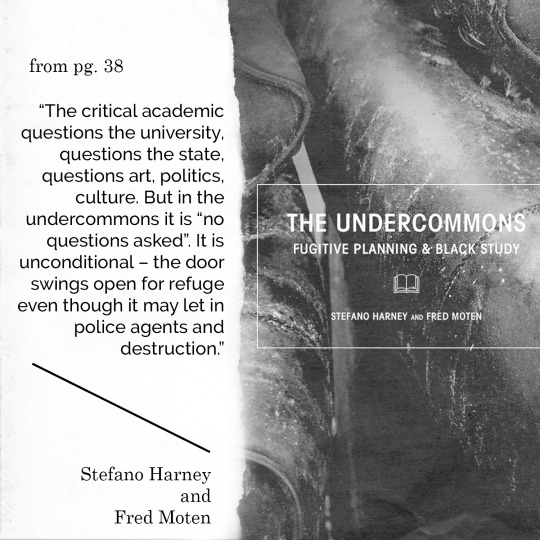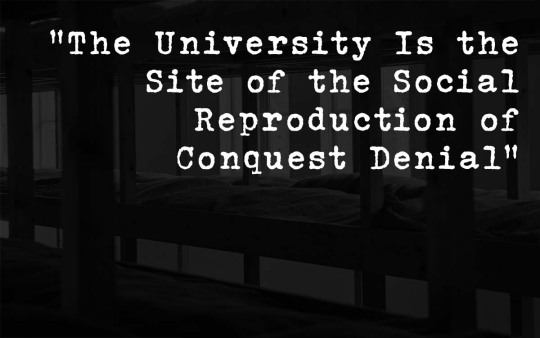Quote
What is, so to speak the object of abolition? Not so much the abolition of prisons but the abolition of a society that could have prisons, that could have slavery, that could have the wage, and therefore not abolition as the elimination of anything but abolition as the founding of a new society.
Stefano Harney and Fred Moten, The Undercommons: Fugitive Planning & Black Study, p. 42. (via fourcrazycatlady)
17 notes
·
View notes
Quote
The university, then, is not the opposite of the prison, since they are both involved in their way with the reduction and command of the social individual. And indeed, under the circumstances, more universities and fewer prisons would, it has to be concluded, mean the memory of the war was being further lost, and living unconquered, conquered labor abandoned to its lowdown fate. Instead, the undercommons takes the prison as a secret about the conquest, but a secret, as Sara Ahmed says, whose growing secrecy is its power, its ability to keep a distance between it and its revelation, a secret that calls into being the prophetic, a secret held in common, organized as secret, calling into being the prophetic organization.
Harvey Moten and Stefano Harney, The Undercommons: Fugitive Planning and Black Study (42)
2 notes
·
View notes
Quote
Here one comes face to face with the roots of professional and critical commitment to negligence, to the depths of the impulse to deny the thought of the internal outside among critical intellectuals, and the necessity for professionals to question without question. Whatever else they do, critical intellectuals who have found space in the university are always already performing the denial of the new society when they deny the Undercommons, when they find that space on the surface of the university, and when they join the Conquest denial by improving that space. Before they criticize the aesthetic and the Aesthetic, the state and the State, history and History, they have already practiced the operation of denying what makes these categories possible in the underlabor of their social being as critical academics.
Fred Moten and Stefano Harney
0 notes
Quote
If one were to insist the opposite of professionalization is that fugitive impulse to rely on the Undercommons for protection, to rely on the honor, and to insist on the honor of the fugitive community; if one were to insist the opposite of professionalization is that criminal impulse to steal from professions, from the university, with neither apologies nor malice, to steal the Enlightenment for others, to steal oneself with a certain blue music, a certain tragic optimism, to steal away with mass intellectuality; if one were to do this, would this not be to place criminality and negligence against each other? Would it not place professionalization, would it not place the university, against honor? And what then could be said for criminality?
Fred Moten and Stefano Harney
0 notes
Text
Meanwhile, that critical academic in the university, in the circle of the American state, questions the university. He claims to be critical of the The University and the Undercommons 111 negligence of the university. But is he not the most accomplished professional in his studied negligence? If the labor upon labor, the labor among labor of the unprofessionals in the university sparks revolt, retreat, release, does the labor of the critical academic not involve a mockery of this first labor, a performance that is finally in its lack of concern for what it parodies, negligent? Does the questioning of the critical academic not become a pacification? Or, to put it plainly, does the critical academic not teach how to deny precisely what one produces with others, and is this not the lesson the professions return to the university to learn again and again? Is the critical academic then not dedicated to what Michael E. Brown phrased the impoverishment, the immiseration, of society’s cooperative prospects? This is the professional course of action. This enlightenment-type charade is utterly negligent in its critique, a negligence that disavows the possibility of a thought of outside, a nonplace called the Undercommons—the nonplace that must be thought outside to be sensed inside, from whom the enlightenment-type charade has stolen everything for its game.
0 notes
Quote
…what can it mean to be critical when the professional defines himself or herself as one who is critical of negligence, while negligence defines professionalization? Would it not mean that to be critical of the university would make one that professional
par excellence, more negligent than any other? To distance oneself professionally through critique, is this not the most active consent to privatize the individual? The undercommons might by contrast be understood as wary of critique, weary of it, and at the same time dedicated to the collectivity of its future, the collectivity that may come to be its future.
Stefano Harney and Fred Moten, “The University and the Undercommons” (38) (via yasmineanderson)
2 notes
·
View notes
Text

[ID: From pg. 38 “The critical academic questions the university, questions the state, questions arts, politics, culture. But in the undercommons it is ‘no questions asked’. It is unconditional — the door swings open for refuge even though it make let in police agents and destruction.” — Stefano Harney and Fred Moten]
2 notes
·
View notes
Text
If public administration is the competence to confront the socialization thrown up continuously by capitalism and to take as much of that socialization as possible and reduce it either to something called public or something called private, then immediately all three scholarly positions become invalid. It is not possible to speak of a labor that is dedicated to the reproduction of social dispossession as having an ethical dimension. It is not possible to decide the efficiency or scope of such labor after the fact of its expenditure in this operation by looking at it once it has reproduced something called the public or something called the private. And its not possible to be critical and at the same time to accept uncritically the foundation of public administrationist thought in these spheres of the public and private, and to deny the labor that goes on behind the backs of these categories, in the undercommons, for instance, the republic of woman who run Brooklyn.
Fred Moten, Stefano Harney The Undercommons: Fugitive Planning and Black Study
4 notes
·
View notes








